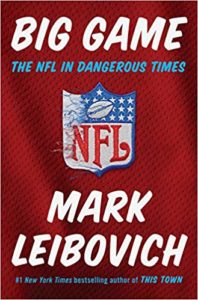 I don’t usually bother writing anything about sports, or sports writing. That’s because as marketplaces for hot takes and punditry go sports is at least as glutted as politics … but without the saving grace of relevancy to something more important than mere entertainment and distraction.
I don’t usually bother writing anything about sports, or sports writing. That’s because as marketplaces for hot takes and punditry go sports is at least as glutted as politics … but without the saving grace of relevancy to something more important than mere entertainment and distraction.
That said, I do like sports. And follow them. Always have. Baseball in particular. (The play-off series between the Red Sox and Astros should be the best of all of them this year.) And, I like pro football, something I say somewhat ashamedly, given everything we all know about the NFL. On the other hand, I know next to nothing about hockey and only kick into basketball gear in March when the Kansas Jayhawks, recipients of thousands of dollars of Lambert tuition cash, make a run at a title.
All that said, for many years I have been a regular reader and fan of Star Tribune sports writer Pat Reusse. Especially the cranky, pissed-off, had-it-up-to-here Reusse we can read this morning as he rakes Timberwolves superstar Jimmy Butler and coach Tom Thibodeau over the coals for Butler’s pre-meditated, maximum media exploitation tantrum at a recent practice session. (Bottom line to that little drama: Butler doesn’t want to play for the Wolves anymore.) What I (and many others) like is that Reusse both has and regularly deploys a license few other columnists on any beat enjoy in this town.
For the record, Reusse and I have crossed paths over the years, but that’s it.
 He came to mind often as I inhaled the latest book by New York Times writer, Mark Leibovich. Normally encamped in DC reporting and commenting (acidly) on the vanities, delusions and perfidy of our ruling class (both government and media), Leibovich cadged a book deal to check out the NFL at the highest levels. The result, “Big Game: The NFL in Dangerous Times” is a unique, delicious and frequently hilarious vivisection of a class of bizarre-to-dysfunctional characters, namely NFL owners and NFL management, constantly obsessed over and “reported” on by literally thousands of professional writers. (There are a lot of good reasons why “Big Game” has not been mentioned on any NFL telecast.)
He came to mind often as I inhaled the latest book by New York Times writer, Mark Leibovich. Normally encamped in DC reporting and commenting (acidly) on the vanities, delusions and perfidy of our ruling class (both government and media), Leibovich cadged a book deal to check out the NFL at the highest levels. The result, “Big Game: The NFL in Dangerous Times” is a unique, delicious and frequently hilarious vivisection of a class of bizarre-to-dysfunctional characters, namely NFL owners and NFL management, constantly obsessed over and “reported” on by literally thousands of professional writers. (There are a lot of good reasons why “Big Game” has not been mentioned on any NFL telecast.)
Journalism has long been divided into two camps. 1: Beat writers who rely on regular access to sources in order to feed news (or “nuggets” as Leibovich likes to call breathless sports minutiae) to their editors and readers. And 2: Columnists who are charged with applying something like accountability to pretty much the same stories, usually by writing cranky, dyspeptic things about failing coaches and athletes. The twain does not often meet, and truth be told, most mainstream publications, print or on-line, are still highly reluctant to print everything a writer knows for damn certain about the characters they cover. It’s a game of mutual benefit, you see.
Truth be told, most sports and just about all business writing can be filed under the heading of “Service Journalism”, where the intended effect is to sustained a comfortable, symbiotic relationship between source and publication.
Reusse’s decades of service to the local sports scene and his deep entrenchment in the culture, from obscure utility infielders to high-profile owners gives him unusual sway over nervous editors. He can say things no one else can. That relative lack of managerial fetters is essential to his standing with intensely skeptical readers who know — from first-hand experience how watered down, neutered and homogenized most “coverage” — in sports, business and media — really is.
As my old pal David Carr used to say when I asked him about the new world of access that opened for him when he signed on with The New York Times, “Shit, everyone returns your call when your last name is ‘New York Times’.”
So it was with Leibovich, who not only has his calls/e-mails to NFL commissioner Roger Goodell, superstar quarterback Tom Brady and dozens of owners returned, but goes on to spend significant time with them. On the sidelines, in (one of) their multi-million dollar mansions and occasionally even while they’re in the company of their latest 14 year-old girlfriend, they talk to Leibovich. (“Fourteen” is not an accurate number when describing Patriots owner and major Trump supporter Robert Kraft, but you get the idea.)
The great, satisfying beauty of Leibovich’s writing is how he fully exploits the rare access he’s been allowed and doesn’t hesitate to drop the accountability hammer. Hell, he relishes it. (Garden variety writers and editors accept the neutered, half-a-story-is-better-than-none access protocol, because they’d be shut out of executive suites and clubhouses — and all those revealing post-game interviews — if they actually told the public what an asshole, fool or drunk so-and-so really is.) But then Leibovich doesn’t have to worry about coming back to cover jock world probably ever again.
Not that Reusse has had unimpeded free reign, mind you. His most fully-formed perspective of Zygi Wilf and the NFL’s shakedown of Minnesota politicians during the run-up to building our billion-dollar sports temple (U.S. Bank Stadium) didn’t appear in the Star Tribune, which, notoriously, was constantly boosting the project/taxpayer giveaway through every channel available to it. Reusse’s most, uh, “acute” commentary was quarantined over on his KSTP radio blog.
To let Reusse, arguably the paper’s most influential columnist in terms of shaping public opinion, rail on, Leibovich-like, right there in the Star Tribune’s own pages was unthinkable. Fully informing the public and lacerating the NFL for its ham-fisted extortion threats, local politicians for their comical, beyond parody, star-struck jowl-rubbing with Goodell when he made a rajah’s visit to Minnesota would have seriously undercut the paper’s Prime Directive. Namely, to build a stadium at whatever the cost and thereby guarantee the presence of a team — the Vikings — that drives the sale of millions of copies of the Star Tribune each and every year. (Reusse may have concurred with the quarantine, I don’t know.)
We can all live with the standard, fawning, half-the-story access reporting when the issue at hand is just some ego-crazed ballplayer ranting at teammates. But it sets (really) serious when that kind of coverage assists in sucking millions of taxpayer dollars away from other far, far more relevant services to build a stadium for, as Leibovich says, a sports league as rich and unchecked as any international cartel.

I went to re-read the May 2012 AM 1500 Ruesse article I think you’re talking about — documenting how something like $450 million of “the Wilf’s $600 million share” of stadium financing was by paid people other than the Wilfs. To your point, that’s something I never see reported elsewhere, along with articles documenting how the value of Wilf’s team has skyrocketed since taxpayers heavily subsidized him. Unfortunately, the link to that unusually candid Ruesse article is now dead.
All of which is to say, I agree about Reusse. I like Michael Rand too. He’s less edgy and colorful than Patrick, but he has more candid, thought-provoking and unusual sports takes than most sports columnists and reporters.